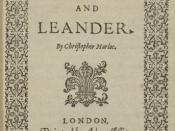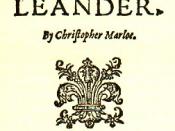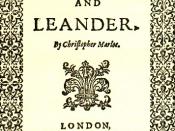Hero and Leander is conventionally regarded as a fragmented poem. Many critics hold the view that Marlowe never actually finished his poem, but left it incomplete at his death. This view is supported by the existence of two contemporary continuations of Marlowe's work. It seems self-evident that any poem that can be completed must in itself be incomplete. However other critics, such as Marion Campbell have challenged this inference:
"We should treat with caution the assumption that Marlowe's poem is incomplete, if this is based on no more than a logical inference from the fact that it was 'completed' by another poet."
As Campbell rightly asserts, if we are to accept the view that Marlowe's work was left unfinished, we must find evidence for this within the poem itself. However, in this essay, I aim to demonstrate that a close scrutiny of his work suggests that the ending Marlowe left us with is a perfectly plausible, if not entirely appropriate conclusion, in light of the poem's themes and tone.
One of the main ways critics have regarded Marlowe'sHero and Leander to be unfinished is in relation to its original source. Marlowe took his basic story from the fifth century narrative poem of Musaeus, The Grammarian. However, Marlowe only recounts a portion of this story. Indeed, Musaeus' original tale ends in tragedy. Leander drowns swimming the Hellespont when the signal torch, lit by Hero, is extinguished by a strong wind. The next morning, Leander's body is washed up on the shore, where it is recognised by Hero from the window of her tower. In despair at the loss of her lover, Hero casts herself down from this great height into the sea, and so ends her own life too. However, there is no such a tragic conclusion to Marlowe's interpretation.



Hero and Leander
Thanks for a good poetic analysis. You seem to have a good grasp of the poem's meaning. Nicely done!
6 out of 6 people found this comment useful.